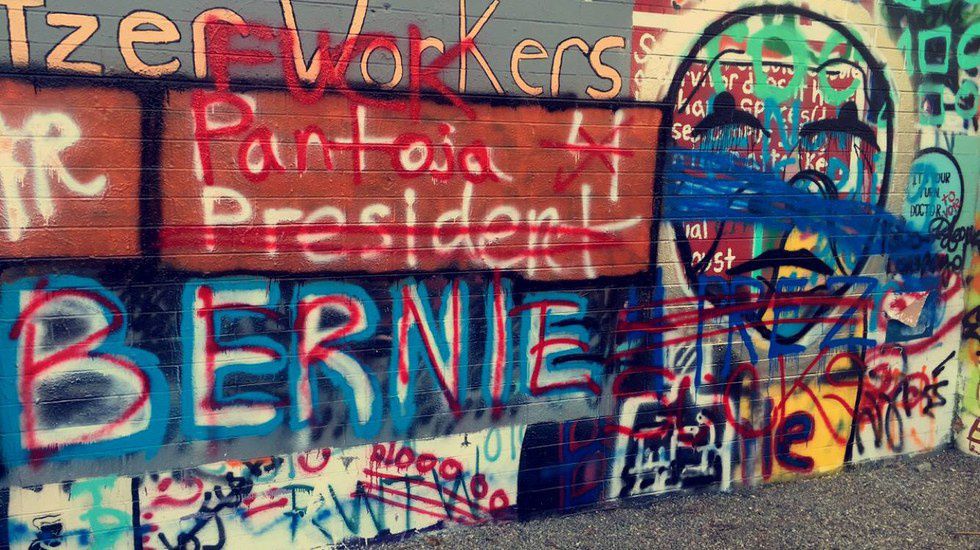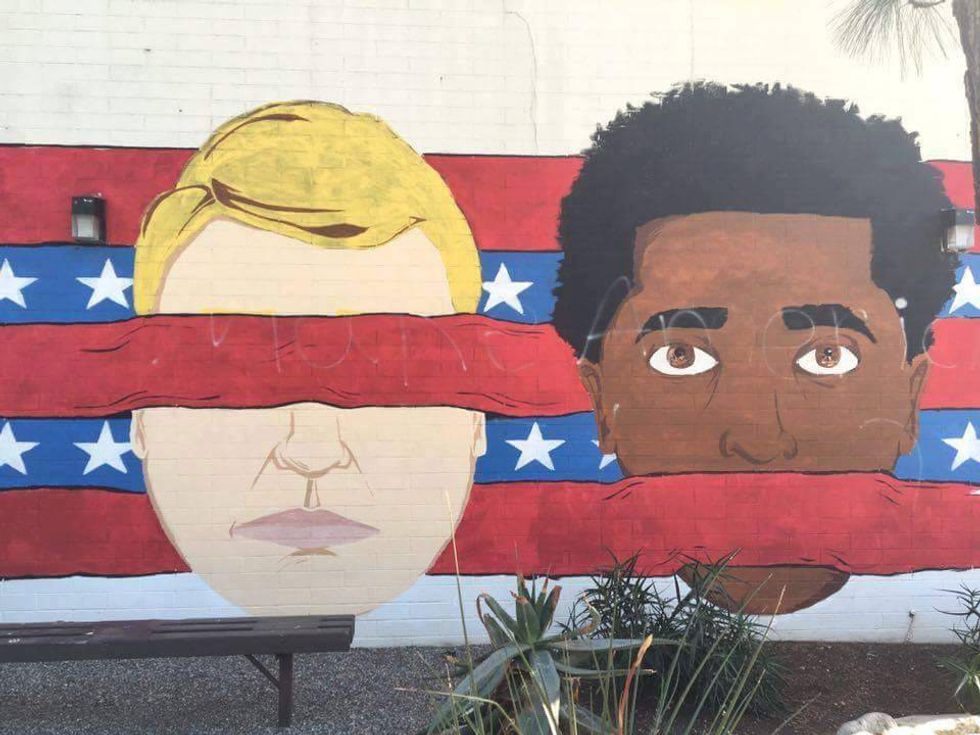It was a Saturday morning in early April. Going through my typical routine of coffee and regrets from the night before, I was looking forward to the Latinx Student Union's annual Rockabilly Festival which ended up a huge success and enjoyable as always. A tradition for me since the inception of the event nearly a decade ago, I've always been a proud attendee of the event. Unfortunately, the cultural celebration was marred by events on campus that would change me beyond ways in which I admitted at the time. During this same period, I was campaigning as a candidate for Student Senate President of Pitzer College, which I would go on to lose in a close race to friend and fellow social justice advocate, Josue Pasillas. Despite it being a seemingly exciting point in time, by the end of that Saturday, I went from Student Senate presidential candidate to a target of far-right bigotry.
In case it isn't clear, my name is Elijah Pantoja, and my campaign mural was defaced: changed from "Pantoja 4 President" to "Fuck Pantoja". According to school officials, the individual who conducted the hate crime spray painted over multiple areas of Pitzer's campus, six of which were not authorized for public art. A part of a broader national trend known as "The Chalkening", the words, "Trump", and "Make America Great Again" were spray-painted over very public and visible parts of the college. In tandem with the attack on my campaign the Pitzer administration, after numerous missteps and no intention of immediately removing the vandalism, declared the act a hate crime. At that point, reactions poured in from across the nation. The Claremont College's independently run Claremont Independent ran their own version of what happened without consulting me, spreading the story like wildfire across conservative news outlets, though they used my Facebook status to create a false image of what had happened. I've already responded to their article, which you can read here.
Though I was certainly angered and saddened by the attack on my name, the vandalism in the above picture is what impacted me most. "Make America Great Again" was scrawled across the mural. Seeing the defacement of this art piece caused me to cry in public for the first time in years. A permanent mural developed by Pitzer alum Adrian Brandon, it depicts the violent and racial past and present of the United States. As a positive side note, Adrian is an amazing artist and you can check out more of his art on his website.
Because of my campaign, I decided it would be best to push my emotions aside until I could give them my full attention. However, by the time the race had come to an end, finals were looming. Rather than talking with the school's case manager and my professors about receiving extensions, I decided to try and push through, against the advice of both my therapist and the case manager. By the time papers were due, they simply weren't complete, and it was only in thanks to my accepting and understanding professors that I was able to eventually receive the extra time I needed. Though in the end, I completed my courses, pushing my emotions aside had taken its toll. I had slipped into poor sleeping habits, lack of interest in my passions, and I had to turn down an amazing internship opportunity.
The Bipartisan Policy Center offered me a position on their Immigration Policy Team, but after the events on campus, I was in no condition to perform at the level I would have expected of myself. It was one of the worst feelings of my life. I felt like I had failed myself, and in a certain way, I had. I didn't let myself down because I wasn't able to mentally handle the move to D.C., living alone, and maintaining such an intense internship, I disappointed myself because I hadn't addressed my emotions and mental health earlier. Had I been honest with myself, my parents, my therapist, and professors, maybe I'd be in D.C. Even if that wasn't to be the case, I'd have handled my emotions in a positive, healthy way. Instead, I have ruined friendships, a relationship, and created distance from family. Granted there had been traumatic issues from my past that played a part in all this, the early April period is what finally broke me down.
Now, I've been encouraged by my therapist to be clinically evaluated for depression, PTSD, and other mental health issues. Taking medication for illnesses that aren't physical scares the hell out of me. It makes me feel all sorts of ways, none of them good. Despite all of this, it feels good to begin addressing the issues I faced, and it is the only reason I'm able to write this article. One of the most important things I've learned is to be open with your feelings. Sure, some people may try to take advantage of your vulnerability, and you will have to effectively combat that, but successfully confiding in, and trusting others is one of the best feelings in the world. It's difficult, and often seems impossible if you've had traumatic experiences in the past, but I promise it is doable. If you have the resources to see a therapist that deals specifically with issues of identity, I would strongly encourage it. If not, affinity groups as a whole and other members of these groups are a great resource as well.
If you're to take one thing away from this article, it's that you need to listen to your body and prioritize your mental health. There are physical signs of internal struggle, but you will also notice signals such as a change in personality, change in your diet, or a difference in your sleep patterns. I'm not a doctor, but these were signs when I was struggling. You'll also just know when you are, and to make your mental health a priority is not a sign of weakness of a source of shame, it is a sign of maturity and strength. Without it, it is impossible to hold yourself to the high standards you've undoubtedly developed for yourself. You'll only make yourself feel worse after failing to meet a deadline, distancing yourself from family, or even ruining a relationship.
Take the time you need to care for yourself because your mental health matters, and you matter. Students of color in higher education is truly a beautiful sight to see, and it was scary thinking how close I came to withdrawing. In order to hopefully prevent that among other students of color, I offer you this advice with hope and a large amount of vulnerability.























